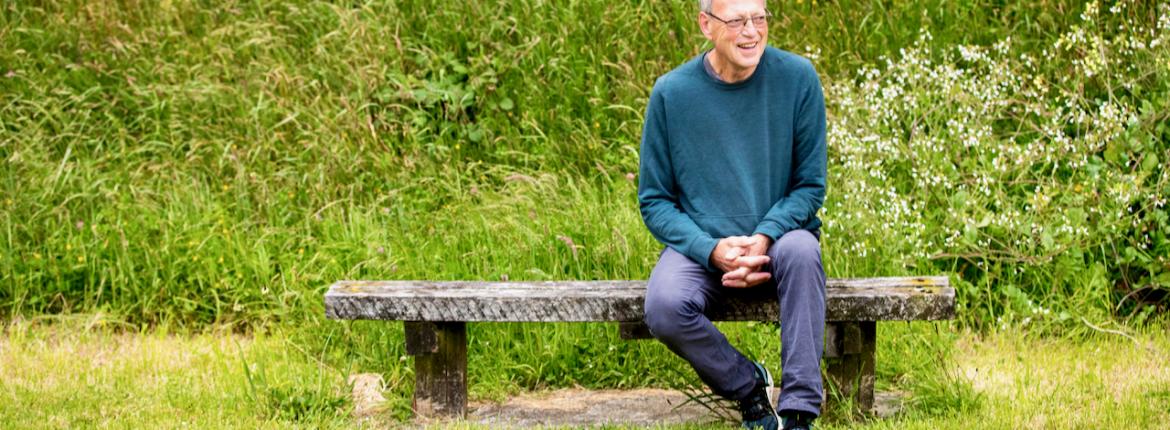It is surely one of the most intriguing job titles around: freelance professional historian. And if anyone is qualified to call themselves one, it’s Jock Phillips, former Chief Historian, scholar, editor of Te Ara online encyclopaedia, conceptual leader for Te Papa Tongarewa’s inaugural history exhibitions and writer of many books on New Zealand history.
The ‘freelance’ bit of his job title is because, in theory, he’s retired. “I wouldn’t know what to do if I wasn’t reading and thinking about history – that’s what keeps me alive. I’ve always got something on the boil. I am a hired hand if anyone wants my expertise in history.”

Jock Phillips, professional freelance historian and author. © Nicola Edmonds
For 14 years Jock was New Zealand’s Chief Historian, working for the Ministry of Culture and Heritage to oversee official history projects and supporting community-based heritage projects. While in that role, the idea of Te Ara evolved. The timing was perfect, as the worldwide web was taking hold. “I realised the advantage of an encyclopaedia on the web; it would be so much more accessible, and you could update it as things change. It’s alive and always will be.”
Making history, specifically New Zealand history, accessible to more people has long been one of Jock’s priorities. As many people will relate to, when Jock was at school students were taught only British history. He recognised the importance of New Zealanders understanding the distinctive and wonderfully rich history of this country and set his career on making that history accessible. “I am very keen for history to be available to ordinary New Zealanders and that New Zealanders will be excited by their history.”
He believes that understanding history helps society understand and identify itself. “That’s one of the jobs of an historian, contributing to New Zealanders’ understanding of their own society.”
While the work of historians might not be overtly political, there can be political implications. “If you read, for example, about the Māori land loss and the confiscation of Māori land in 19th Century, it helps you to understand the situation for the Māori community today.”
As well as teaching, curating and editing, Jock is also a prolific writer, with his name on 15 history titles. The latest being the wildly popular A History of New Zealand in 100 Objects. “I was interested in doing a general history and this seemed a great way of putting it together because it allowed me to tell some good stories and at the same time provide people with the main developments in New Zealand history.”
First, he divided the country’s timeline into nine periods: one covering up to the arrival of Europeans (in 1759), one covering from then up to 1840 and, from that date, periods representing every 20 years.
He then looked around for 10 or so objects for each, thinking about the important things that happened historically, then choosing objects with good stories attached to them which would throw light on the developments of that period.
The search for the 100 featured objects involved travelling to museums all around New Zealand, talking to curators.
“I decided that they would all be in New Zealand and in public collections. So, I went around the museums and asked, ‘what are the jewels in your collection?’ I did about seven or eight road trips. It was hard work but fun and really valuable. The Government gives money to Te Papa because it looks after the national collection but my thinking is that the national collection is all over the country; the things that are important to the nation can be found in Murchison or Hokitika or Gisborne or Arrowtown.”
The oldest item is an 80 million-year-old crocodile jaw; the newest from 2020. He tried to give fair representation of the geography of the country and not be weighted too much in favour of the 20th Century.
“I tried to include stories about popular culture about war, about family life – I had to make sure that women were well represented and different ethnic groups – Irish, Scots, Māori obviously – so I made a real effort to include as many different contributors to the New Zealand experience as possible.”
He approached this project as a storyteller: “Where possible, I tried to have the object attached to an individual, someone like Winston Reynolds who made the first television set in New Zealand – and a great story about a fellow who was pulled out of the rubble of Napier Tech after the Napier earthquake…”
He agrees that another historian would probably choose completely different objects. “This is my walk through New Zealand history,” he says. “I’ve written a few books and I’ve never had as many warm responses as this one. People get the point, which delights me.”
Click here to enter the draw to win one of five copies of Jock Phillips' book, A History of New Zealand in 100 Objects
Read more from this AA Directions issue while you're here:
- Discover a talented builder of replica 1931 Alfa Romeo racing cars
- We meet a healer using traditional rongoā (Māori medicine)
- A family-owned business making high-quality knives for hunters and chefs
- Protect the things you treasure with AA Home and Contents Insurance
Reported by Kathryn Webster for our Autumn 2023 issue




